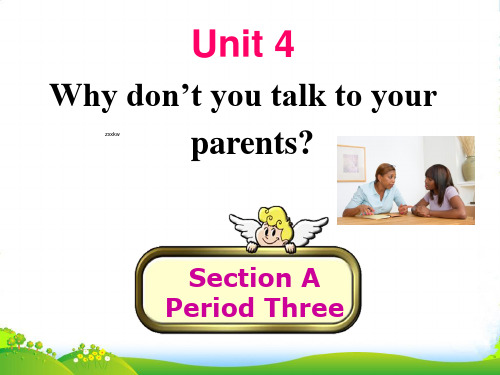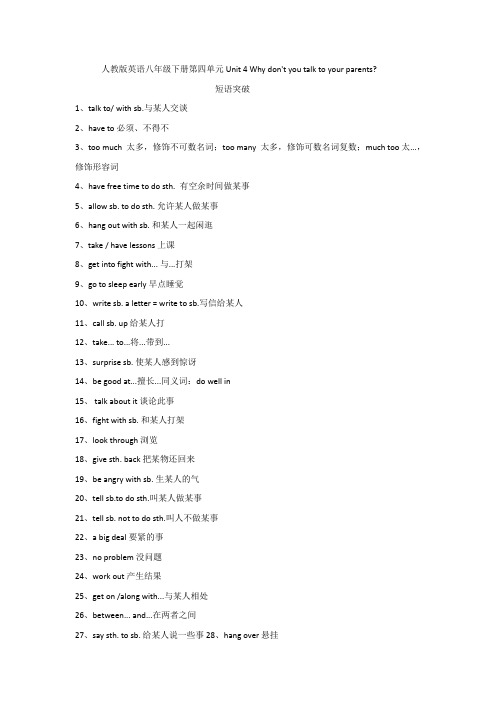八年级英语下册 Unit 4 Why don’t you talk to your parents(第5课时)同步练习 (新版)人教新目标版
人教八年级英语下册《Unit 4 Why don't you talk to your parent

4. Kids shouldn’t play computer games until late at night. They should rest early.
◆You could do … : “你(可以) 做……” ◆ Let’s do … : “让我们做……吧!” ◆ “主语+had better (not)+动词原形” :
“……最好(不要)做某事” You’d better go to school on time. ◆ It’s best to do ... : “做……再好不过 了。”
• 3. You could save more money __s_o_t_h_a_t_ you can buy a gift for your friend’s birthday.
4. Kids shouldn’t play computer games ___u_n_t_i_l __ late at night. They should rest early.
Guess
1. H__o_w__a_b_o_u_t going out for a walk? 2. W__h__a_t _a_b_o_u_t_ another cake? 3. W__h__y_d_o_n_’_t_ you _t_u_r_n__to__ the
reference book? 4.Why _d_id_n_’_t you s_e_e_ the football match? 5.W__h_y__d_o_n_’_t _y_o_u_ go there with us? 6. W__h__y_n_o_t_ go fishing today?
人教版英语八年级下册Unit 4 Why don’t you talk to your parent

2019-2020学年人教版英语八年级下册Unit 4 Why don’t you talk to your parents?课文知识点总结Section A1.Why don’t you talk to your parents? 你为什么不和你打父母谈谈呢?【解析】Why don't you do sth ?= Why not do sth? 为什么不......呢?【拓展】用于提建议的句型有:(1)What about doing sth ?=How about doing sth? ….怎么样?(2)Why don’t you do sth?= Why not do sth? 为什么不呢?(3)Let’s do sth.让我们一起做某事吧。
(4)Shall we/I do sth?我们做…好吗?(5)had better do/not do sth 最好做/不做某事(6) Will/Would you please do sth 请你做…好吗?(7) Would you like to do sth? 你想去做某事吗?(8)Would you mind doing sth?你介意做某事吗?【回答】(1). 同意对方的建议时,一般用:◆Good idea./ That’s good idea. 好主意◆OK/ All right./ Great 好/ 行/太好了◆Yes, please ./ I’d love to 是的/ 我愿意◆I agree with you 我同意你的看法◆No problem 没问题◆Sure/ Of course/ Certainly 当然可以◆Yes, I think so 对,我也这样想(2).对对方的帮助或要求表示委婉谢绝时,一般用:◆I don’t think so 我认为不是这样◆Sorry, I can’t 对不起,我不能◆I’d love to, but…◆I’m afraid…我愿意,但恐怕……2.I have to study too much so I don’t get enough sleep.我要学的太多,因此我睡眠不足。
八年级英语下册 Unit 4 Why don’t you talk to your parents短语、句型、作文汇总 (新版)人教新目标版

Unit 4 Why don’t you talkto your parents?【重点单词】allow [əˈlaʊ] v. 允许,准许wrong [rɔŋ] adj. 错误的What's wrong? 哪儿不舒服?midnight ['mɪdnaɪt] n. 午夜,子夜look through 浏览,快速查看guess [ɡes] v. 猜测,估计deal [di:l] v. 处理,应付big deal 重要的事work out 成功地发展,解决get on with 和睦相处,关系良好relation [rɪˈleɪʃn] n. 关系,联系,交往communicate [kəˈmju:nikeit] v. 沟通,通信,通讯communication [kəˌmju:nɪˈkeɪʃn] n. 交流,沟通argue [ˈɑ:ɡju:] v. 争论,争吵cloud [klaʊd] n. 云elder ['eldə(r)] adj. 年级较长的instead [ɪnˈsted] adv. 代替whatever [wɒtˈevər] pron. 任何,不管什么,无论什么nervous [ˈnə:vəs] adj. 紧张不安的offer ['a:fər] v. 提供,自愿给予proper [ˈprɔpə] adj. 合适的,适当的secondly [ˈsekəndli] adv. 第二,其次explain [ɪkˈspleɪn] v. 讲解,解释,说明clear [klɪə] adj. 清晰的,清楚易懂的copy [ˈkɔpi] v. 复制return [rɪ'tɜ:n] v. 回来,返回,归还anymore ['enɪmɔ:] adv. 不再,再也不member [ˈmembə] n. 成员,会员pressure ['preʃə(r)] n. 压力compete [kəm'pi:t] v. 比赛,竞争opinion [əˈpɪnjən] n. 意见,想法,看法skill [skɪl] n. 技能,技巧typical [ˈtɪpɪkl] adj. 典型的football [ˈfʊtbɔ:l] n. 足球cut out 删去,删除quick [kwɪk] adj. 快的,迅速的continue [kənˈtɪnju:] v. 继续,连续compare [kəm'peə] v. 比较compare…with 比较,对比crazy [ˈkreɪzɪ] adj. 疯狂的,狂热的development [diˈveləpmənt] n. 发育,成长,发展cause [kɔ:z] n. & v. 原因;造成,使发生usual [ˈju:ʒuəl] adj. 通常的,平常的in one's opinion 依… 看perhaps [pəˈhæps] adv. 可能,大概,也许【重点语法】在英语中,表示建议的说法有很多,而且都是中考考查的重点。
人教版八年级英语下册《Unit4 Why don’t you talk to your parent

人教版八年级英语下册《Unit4 Why don’t you talk to your parents》教学设计(第5课时)一. 教材分析人教版八年级英语下册《Unit4 Why don’t you talk to your parents》是本单元的第五课时,主要围绕着如何向父母提出建议展开。
本课时包含两个部分:part A 和part B。
part A包含一个听力活动,一个读写任务和一个口语练习;part B包含一个读写任务和一个口语练习。
本课时旨在帮助学生掌握向父母提出建议的策略,提高他们的听说读写能力。
二. 学情分析学生在之前的学习中已经掌握了如何提出建议的基本句型“Why don’t you…?”和“You should….”,但还需要在实际情境中进行运用和提高。
此外,学生在听力、口语、阅读和写作方面需要进一步的加强和巩固。
三. 教学目标1.知识目标:(1)能够听懂、会说、会读、会写本课时所学的单词和短语。
(2)能够运用所学句型提出建议,并进行简单的交流。
2.能力目标:(1)提高学生的听力能力。
(2)提高学生的口语表达能力。
(3)提高学生的阅读和写作能力。
3.情感目标:(1)培养学生积极主动与父母沟通的习惯。
(2)培养学生珍惜友谊,关心他人的品质。
四. 教学重难点(1)掌握本课时所学的单词和短语。
(2)运用所学句型提出建议,并进行简单的交流。
(1)如何准确地运用听力技巧获取信息。
(2)如何准确地运用阅读技巧获取信息。
五. 教学方法1.任务型教学法:通过完成各种任务,激发学生的学习兴趣,提高学生的学习积极性。
2.情境教学法:通过设定真实的情境,让学生在实际情境中学习和运用英语。
3.交际型教学法:通过小组讨论、角色扮演等方式,培养学生的交际能力。
六. 教学准备1.教材:人教版八年级英语下册《Unit4 Why don’t you talk to your parents》。
2.课件:根据教学内容制作的课件。
人教目标版八年级下册Unit4 Why don’t you talk to your parents

If you’re Linda Miller. Tell us your opinion about after-school classes.
I don’t really agree that children should take after-school classes. I think(In my opinion, )it’s crazy/unfair for children to…. I believe it is better if parents …. People shouldn't....
Why don’t they let their kids be kids?
7. 医生们说太多的压力不利于孩子们的成长。
Doctors say too much pressure is not good for a child's development.
8. 所有这些活动会给孩子们导致很大的压力。
Unit 4 Why don’t you talk to
your parents? Period5
1. 家庭成员 2. 独自消磨时光 3. 给某人那么多的压力 4. 与某人竞争 5. 取得更好的成绩 6. 业余活动 7. 互相
family members spend time alone give sb. so much pressure compete with sb. get better grades free time activities each other
The most common activity I want to do is that …
八年级英语下册 口头表达专练 Unit 4 Why don’t you talk to your p

Why don’t you talk to your parents? B This information comes from Yang Xuehui at Shili middle school in Xihe, Gansu.Section B 1a参加体育运动和朋友们一起闲逛和父母或其他家庭成员交谈独自消磨时光玩电脑游戏看书看电影1c父母给我许多学业压力。
我睡眠不足。
我没有足够的闲暇时间。
我和父母吵了一架。
在学校我不得不和同班同学竞争。
1d1. 尽管你可能和父母在一起不开心,但是你应当和他们谈谈。
问问他们为什么给你那么多压力。
2. 生活不应该只看重分数。
闲时活动诸如运动以及跟朋友闲逛也是挺重要的。
3. 你不应该为了取得较好成绩跟同学较劲。
你们都应该互相帮助共同提高。
2b或许你应该学会放松!如今,中国孩子有时周末比上学日还要忙,因为他们不得不上那么多的课外班。
他们中许多人在学习考试技巧以便他们能进入一所好的高中再后来可以上一所好大学。
另外一些人在参加体育训练以便他们能在比赛中获胜。
然而,这不仅仅发生在中国。
泰勒一家是一个典型的美国家庭。
对于凯茜•泰勒的三个孩子来说,生活是忙碌的。
“在大多数日子的放学后”,凯茜说:“我把两个儿子中的一个带去练篮球,女儿去训练足球。
然后我还得送另一个儿子去上钢琴课。
或许我可以减少一些他们的活动,但我相信这些活动对我孩子的将来是很重要的。
我真希望他们将来成功。
”然而,疲劳不堪的孩子们直到晚上7点才回到家。
他们匆匆忙忙吃完饭,接着就该做作业了。
琳达•米勒,一位有三个孩子的母亲,清楚这一切的压力。
“在有些家庭里,竞争从很小就开始了,一直持续到孩子长大成人。
妈妈们把自己的孩子送到各种各样的学习班。
她们老是拿自己的孩子和别人家的孩子对比。
这简直是疯了。
我觉得这不公平。
他们为什么不能让孩子做回孩子呢?人们不应该把孩子逼得那么紧。
“医生说太多的压力对孩子们的发展是有害无益。
Unit4Whydon'tyoutalktoyourparents_短语突破人教版英语八年级下册

人教版英语八年级下册第四单元Unit4Why don't you talk to your parents?短语突破1、talk to/with sb.与某人交谈2、have to必须、不得不3、too much太多,修饰不可数名词;too many太多,修饰可数名词复数;much too太...,修饰形容词4、have free time to do sth. 有空余时间做某事5、allow sb.to do sth.允许某人做某事6、hang out with sb.和某人一起闲逛7、take/have lessons上课8、get into fight with...与...打架9、go to sleep early早点睡觉10、write sb.a letter=write to sb.写信给某人11、call sb.up给某人打12、take...to...将...带到...13、surprise sb.使某人感到惊讶14、be good at...擅长...同义词:do well in15、talk about it谈论此事16、fight with sb.和某人打架17、look through浏览18、give sth.back把某物还回来19、be angry with sb.生某人的气20、tell sb.to do sth.叫某人做某事21、tell sb.not to do sth.叫人不做某事22、a big deal要紧的事23、no problem没问题24、work out产生结果25、get on/along with...与某人相处26、between...and...在两者之间27、say sth.to sb.给某人说一些事28、hang over悬挂29、be nice to sb.对某人友好30、refuse to do sth.拒绝做某事31、feel lonely感到孤独。
八年级英语下册 Unit 4 Why don't you talk to your parents作

“我的妈妈……杂志……”可知look through符合句意。因此答案选
B。
11.We should learn how to ________ well with people around us. A.get along B.get down
C.get to D.get up
A 【解析】get along (well)with sb.为固定搭配,意为“和某人相
果”;even if意为“尽管”;if only意为“只要;但愿”。根据句意
“他说的很清楚……每个人都理解他说的意思”可知so that 符合句 意。因此答案选B。
13 . He speaks ________ English ________ French.Instead , he speaks German. A.either;or B.not only;but also C.both;and D.neither;nor D 【 解 析 】either...or... 意 为 “ 或 者 …… 或 者 ……” ; not
so 意为“因此”;if意为“如果”。根据句意“法兰克过着简朴的
生活……他有很多钱”可知although符合句意。因此答案选A。
9.—May I borrow this book?
—Of course,please ________ it in two weeks. A.turn B.return C.give D.delete
处(得好)”;get to意为“到达”;get up意为“起来;起床”;get
down意为“下来”,因此答案选A。
12.He spoke clearly ________ everybody understood him. A.so far B.so that C.even if D.if only B 【解析】so far意为“到目前为止”;so that意为“以便;结
- 1、下载文档前请自行甄别文档内容的完整性,平台不提供额外的编辑、内容补充、找答案等附加服务。
- 2、"仅部分预览"的文档,不可在线预览部分如存在完整性等问题,可反馈申请退款(可完整预览的文档不适用该条件!)。
- 3、如文档侵犯您的权益,请联系客服反馈,我们会尽快为您处理(人工客服工作时间:9:00-18:30)。
第五课时 Section B(2a ~ 2e)
Ⅰ.根据句意及首字母提示填写单词。
1.The fans went c________ when the film star appeared.
2.After she took a short break,she c________ doing the housework.
3.P________ Kate will come to visit me this afternoon,I guess.
4.Driving a car too fast may c________ car accidents.
5.Jill likes sports and she often plays f________ with me on weekends.
Ⅱ.用方框中所给单词的适当形式填空。
push,develop,skill,compare,typically
6.He is a ________ Englishman.
7.Many foreign friends are surprised at the fast ________ of China.
8.Our English teacher taught us some reading ________.
9.The car brok e down,so we had to ________ it to the side of the road.
10.Don't ________ yourself with others.You should just be yourself.
Ⅲ.单项选择。
( )11.I can't imagine living like that.I would go ________.
A.shy B.relaxed C.crazy D.lazy
( )12.—I don't want my parents to comp are me ________ others.
—I agree.Everyo ne is different.
A.to B.for C.with D.on
( )13.—Where's your broth er?
—________ he is in the bedroom,but I am not sure.
A.Perhaps B.May be C.Certainly D.Seldom
( )14.The old man didn't hear what I said.He ________ talking without a stop.
A.continued B.stopped C.minded D.forgot
( )15. The Smiths are watching the men’s table tennis match at the moment.
A. Mr Smith
B. Mrs Smith
C. The Smith family
D. Mr Smith and his son
Ⅳ.根据汉语意思完成句子,每空一词。
16.依我看,我们应该去帮助他。
________ ________ ________,we should go to help him.
17.你应该把它删去。
You should ________ ________ ________.
18.吃完饭后,他继续做家庭作业。
He ________ ________ ________ his homework after having dinner.
19.你不要总是把杰克与其他的孩子作比较。
You can't always ________ Jack ________ other children.
20.孩子们应该有时间放松并为自己考虑。
Children should have time________ ________and ________ ________ themselves.
1.take classes 上课
2.the Taylors泰勒一家
定冠词the 加姓氏复数形式表示某人一家或夫妇二人。
3.cut out删除;删去
它是个动副短语,当代词作其宾语时,代词应位于cut与out之间;当名词作其宾语时,名词位于cut 与out 之间或之后。
4.opinion n.意见;想法;看法
in one's opinion根据某人的看法
5.continue v.持续;继续存在
continue to do sth./doing sth.继续做某事
6.compare v.比较
compare…with…把……与……作比较/对比(强调同类相比)
compare…to…把……比作……;把……与……作比较(强调异类相比)
7.think for on eself/sb.为自己/某人考虑
8.perhaps adv.可能;大概;也许
常放在句首,也可放在句中,位于实义动词前,助动词、系动词或情态动词之后。
当堂训练
名校讲坛
第五课时 Sectio n B(2a ~ 2e)
Ⅰ.1.crazy 2.continued 3.Perhaps 4.cause 5.football
Ⅱ.6.typical7.development 8.skills 9.push pare
Ⅲ.11-15 CCAAC
Ⅳ.16.In my opinion17.cut it ou t 18.continued to do pare;with 20.to relax;think for。
